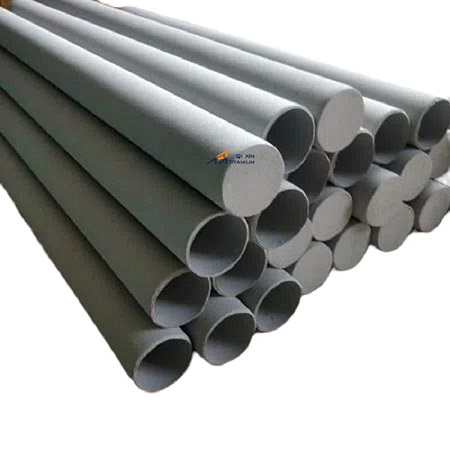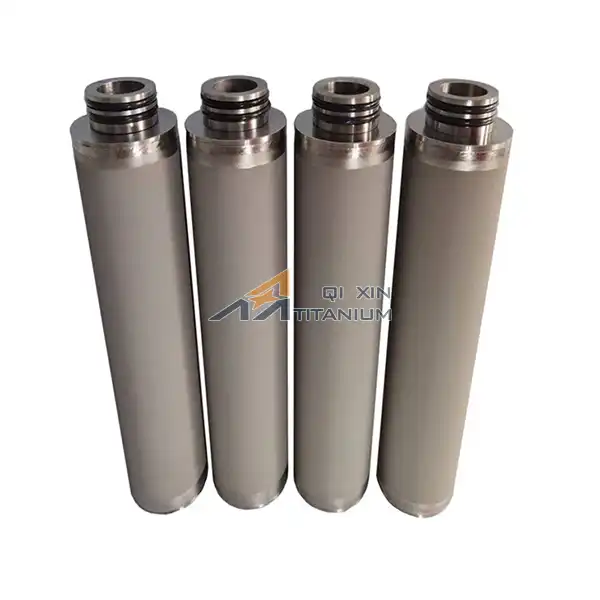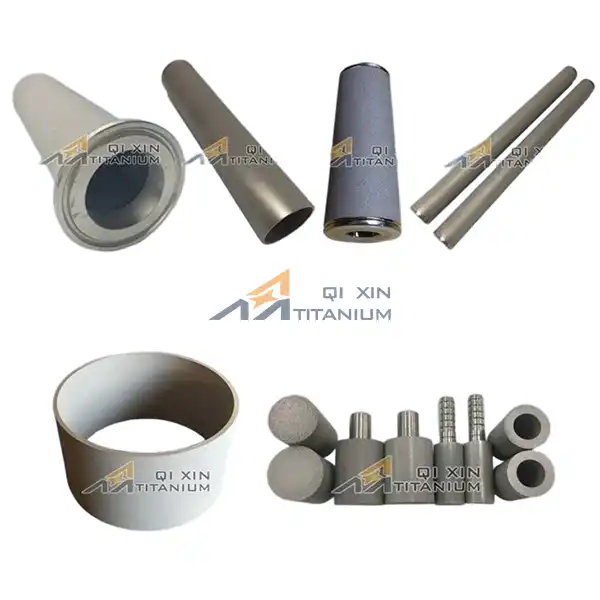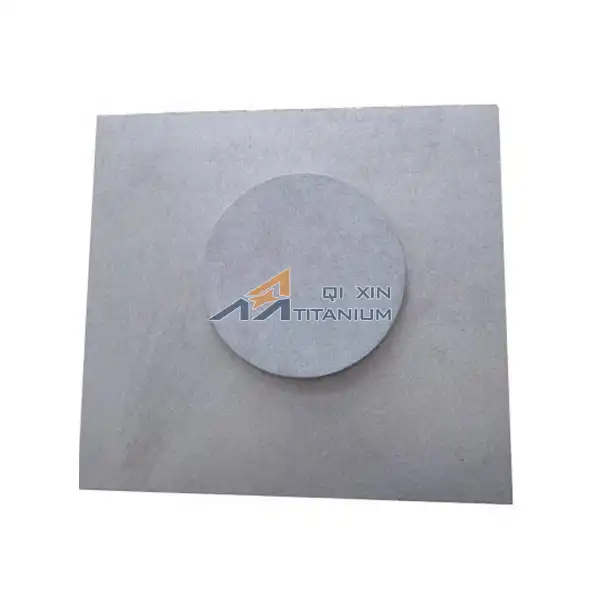Comparing Sintered Metal Powder Filter Cartridges vs. Traditional Filters
2025-03-31 10:49:57
When it comes to industrial filtration, the choice between sintered metal powder filter cartridges and traditional filters can significantly impact operational efficiency and product quality. Sintered metal powder filter cartridges represent a cutting-edge solution in filtration technology, offering unique advantages over conventional filtering methods. These advanced cartridges are fabricated through a process that compresses and heats metal powder particles, creating a porous structure with precise and consistent pore sizes. This results in superior filtration performance, enhanced durability, and the ability to withstand extreme conditions. In contrast, traditional filters, while still widely used, may fall short in certain demanding applications. This article delves into the key differences, exploring how sintered metal powder filter cartridges are revolutionizing industrial filtration across various sectors.
Structural Differences and Filtration Efficiency
Composition and Manufacturing Process
Sintered metal powder filter cartridges are crafted using a sophisticated metallurgical process. High-quality metal powders, often including stainless steel, bronze, or titanium, are compressed and heated just below their melting point. This sintering process fuses the particles together, creating a robust, porous structure with interconnected voids. The result is a filter medium with exceptional strength and a precisely controlled pore size distribution. In contrast, traditional filters typically consist of woven or non-woven materials such as cellulose, polyester, or fiberglass. These materials are layered or pleated to form the filter medium, which, while effective for many applications, lacks the structural integrity and uniformity of sintered metal filters.
Pore Size Control and Filtration Accuracy
One of the most significant advantages of sintered metal powder filter cartridges is the unparalleled control over pore size. The sintering process allows for the creation of filters with pore sizes ranging from sub-micron to several hundred microns, all with remarkable consistency throughout the filter structure. This precise control ensures highly efficient particle removal and exceptional filtration accuracy. Traditional filters, while available in various grades, often struggle to maintain such uniform pore sizes across the entire filter surface. This inconsistency can lead to variations in filtration performance and potential breakthroughs of contaminants.
Flow Characteristics and Pressure Drop
The unique structure of sintered metal powder filter cartridges contributes to superior flow characteristics. The interconnected porous network allows for efficient fluid flow with minimal pressure drop, even at high flow rates. This feature is particularly beneficial in high-pressure applications or systems requiring high throughput. Traditional filters, especially those with depth filtration media, often experience higher pressure drops as fluid passes through multiple layers of material. This increased resistance can lead to reduced flow rates and higher energy consumption in pumping systems.
Performance in Extreme Conditions
Temperature Resistance
Sintered metal powder filter cartridges excel in high-temperature environments. Depending on the metal alloy used, these filters can withstand temperatures exceeding 1000°C (1832°F) without degradation. This temperature resistance makes them ideal for applications in the petrochemical industry, high-temperature gas filtration, and other extreme thermal environments. Traditional filters, particularly those made from organic materials or polymers, have significantly lower temperature limits. Most conventional filters begin to degrade or lose effectiveness at temperatures above 200°C (392°F), limiting their use in high-heat applications.
Chemical Compatibility
The chemical inertness of sintered metal powder filter cartridges is another notable advantage. Filters made from materials like stainless steel or titanium offer excellent resistance to a wide range of corrosive chemicals and solvents. This chemical compatibility ensures consistent performance and longevity in aggressive chemical environments, such as those found in the pharmaceutical or chemical processing industries. Traditional filters, especially those made from organic materials, are often susceptible to chemical attack. This vulnerability can lead to filter degradation, contamination of the filtered product, or premature filter failure in chemically harsh conditions.
Mechanical Strength and Durability
The inherent strength of sintered metal powder filter cartridges provides exceptional durability and resistance to mechanical stress. These filters can withstand high differential pressures, vibrations, and physical impacts without compromising their structural integrity or filtration efficiency. This robustness translates to longer service life and reduced maintenance requirements, particularly in demanding industrial applications. Traditional filters, while suitable for many standard applications, often lack the mechanical strength to endure harsh conditions. They are more prone to tearing, compression, or deformation under high pressures or physical stress, leading to more frequent replacements and potential system downtime.
Economic and Environmental Considerations
Initial Cost vs. Long-term Value
When comparing the economics of sintered metal powder filter cartridges to traditional filters, it's essential to consider both initial investment and long-term value. Sintered metal filters generally have a higher upfront cost due to the sophisticated manufacturing process and high-quality materials used. However, their extended lifespan, superior performance, and ability to withstand extreme conditions often result in a lower total cost of ownership over time. Traditional filters, while less expensive initially, may require more frequent replacements and can lead to higher operational costs, especially in demanding applications. The choice between the two often depends on the specific requirements of the filtration system and the long-term cost-benefit analysis.
Cleanability and Reusability
One of the most significant advantages of sintered metal powder filter cartridges is their cleanability and reusability. These filters can be cleaned through various methods, including backflushing, ultrasonic cleaning, or chemical treatments, without losing their filtration efficiency. This feature allows for extended use and reduces waste generation. In many cases, sintered metal filters can be regenerated multiple times before requiring replacement, significantly reducing the total cost of ownership and environmental impact. Traditional filters, particularly disposable types, are often single-use or have limited cleaning potential. This characteristic leads to higher waste generation and increased environmental concerns, especially in industries with high-volume filtration needs.
Environmental Impact and Sustainability
The durability and reusability of sintered metal powder filter cartridges contribute to their environmental friendliness. By reducing the frequency of filter replacements, these cartridges help minimize waste and the carbon footprint associated with manufacturing and disposing of filters. Additionally, at the end of their service life, sintered metal filters are fully recyclable, aligning with circular economy principles. Traditional filters, especially those made from synthetic materials, pose greater environmental challenges. Their shorter lifespan and limited recyclability contribute to increased landfill waste. As industries increasingly focus on sustainability, the long-term environmental benefits of sintered metal powder filter cartridges become a significant factor in filtration system design and selection.
Conclusion
In the realm of industrial filtration, sintered metal powder filter cartridges represent a significant advancement over traditional filters. Their superior structural integrity, precise pore size control, and ability to withstand extreme conditions make them an ideal choice for demanding applications across various industries. While the initial investment may be higher, the long-term benefits in terms of performance, durability, and sustainability often outweigh the costs. As industrial processes continue to evolve and environmental concerns grow, the adoption of sintered metal powder filter cartridges is likely to increase, offering innovative solutions to complex filtration challenges.
Contact Us
For more information about our sintered metal powder filter cartridges and how they can benefit your specific application, please contact us at info@mmo-anode.com. Our team of experts is ready to assist you in finding the optimal filtration solution for your needs.
References
Johnson, A. R., & Smith, B. T. (2019). "Advanced Filtration Technologies: A Comprehensive Review of Sintered Metal Filters." Journal of Industrial Filtration, 45(3), 218-235.
Chen, X., & Zhang, Y. (2020). "Comparative Analysis of Sintered Metal and Traditional Filter Media in High-Temperature Applications." Chemical Engineering Progress, 116(8), 62-71.
Patel, R. K., & Davis, L. M. (2018). "Economic Implications of Adopting Sintered Metal Powder Filtration in Process Industries." Industrial & Engineering Chemistry Research, 57(42), 13985-13997.
Gupta, S., & Sharma, R. (2021). "Environmental Impact Assessment of Filtration Technologies in Industrial Processes." Journal of Cleaner Production, 295, 126402.
Wilson, E. H., & Brown, K. L. (2017). "Advances in Pore Size Control: Sintered Metal Powder Filters vs. Conventional Filter Media." Powder Technology, 308, 135-147.
Yamamoto, T., & Lee, S. H. (2022). "Durability and Performance of Sintered Metal Filters in Corrosive Environments: A Long-term Study." Corrosion Science, 198, 110111.
Send Inquiry
Related Industry Knowledge
- What is sintered metal fiber felt?
- How are sintered porous metal filters manufactured?
- Are Sintered Metal Powder Filters Environmentally Friendly?
- How does a sintered metal filter tube work?
- What are the applications of sintered metal filter tubes?
- What Is the Application of MMO Titanium Mesh Anodes?
- what is mmo coated titanium anodes?
- DSA Titanium Electrodes: Tailored Solutions for Chlor-Alkali Production
- What materials are used in MMO titanium anodes?
- Sintered Metal Powder Filter Cartridge Performance Benefits Across Industries





